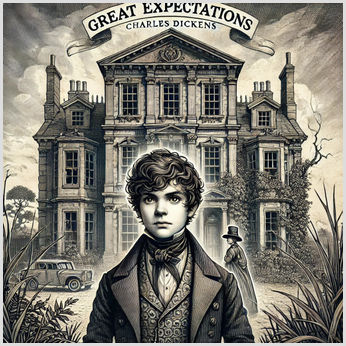The novel Great Expectations was written by Charles Dickens in 1861. It is his penultimate completed novel. Set in Victorian England, the plot focuses on the orphan Pip, who dreams of becoming a gentleman. This article focuses on the main themes Dickens explores, including ambition and commentary on social class.
For support revising this novel for your exam, TeachTutti has a list of qualified GCSE English Literature tutors.
Ambition and self-improvement
Pip dreams of rising above his humble beginnings to win the love of Estella, the adopted daughter of Miss Haversham who is a wealthy and reclusive spinster. His desire to become a gentleman reflects the Victorian belief that hard work and ambition can lead to personal advancement and social mobility. Dickens critiques this Victorian social aspiration as Pip experiences both positive and negative outcomes from his drive for betterment.
The theme of self-improvement is evident when Pip is ashamed of his coarse hands and common boots, which reflect his lower station. This shame and desire to become a gentleman only intensify when he encounters Estella for the first time. The importance of the theme can be seen in the title of the novel, as Pip harbours "great expectations" about his future, longing for a better life.
The detrimental effect of social advancement is seen when Pip begins to distance himself from Joe and Biddy, who both care about him. His aspirations lead Pip to prioritise wealth and status over relationships and personal integrity. This conflict is a pointed critique of the dangers of blind ambition and superficial goals.
Social class
The social class system in Victorian England is present throughout the novel and highlights the strict distinctions between the classes. Pip interacts with characters across the social spectrum, from the wealthy and imposing Miss Havisham to the humble Joe. These exchanges underscore the harsh nature of these social divisions and Pip's struggle to climb the societal ladder.
There is much personal cost to Pip's ascent in social class. He rejects Joe and Biddy as he improves his standing, which corrupts Pip's innate goodness. Pip is unhappy when he finally becomes a gentleman, which contrasts with his initial contentment. This irony shows Dickens' critique of the class system. Joe is always kind in his interactions with other people, showing that true worth isn't determined by social status.
Magwitch as an escaped convict and Pip's companion Herbert challenge the established social order. Magwitch turns into Pip's secret benefactor as the plot develops, leading us to question the assumption that wealth is always associated with virtue. Meanwhile, Herbert remains a true friend to Pip despite his financial struggles, showing the value of character over class.
Crime, guilt and innocence
Magwitch and Jaggers are the main characters who represent crime and justice in the narrative. Pip increasingly feels guilt and redemption from his past mistakes, reflecting the broader social issues of crime and punishment when Dickens was alive. There is also a deep critique of Victorian morality through the representation of the legal system.
Magwitch's transformation from a criminal to Pip's benefactor in the novel showcases Dickens' belief that anyone can redeem themself. Abel's earlier life of crime is as much a reflection of societal neglect as it is his failings, highlighting the harsh legal system. He also returns to help Pip despite the risks, showing that we are innately good and we can't be defined just by our past actions.
Pip's sense of guilt drives his internal conflict. He is initially ashamed of his origins, which gives way to guilt at the way he has treated Joe and Magwitch, who have both cared for him. This drives Pip to seek redemption and make amends. The moral ambiguity surrounding crime and punishment is also shown through highlighted by the lawyer Mr Jaggers. He is detached and pragmatic in his job, showing the impersonal nature of the law, in stark contrast to Pip’s journey towards understanding and forgiveness.
Growing up
During the plot, Pip grows up from a young, naive boy to a mature adult with a complex, more layered understanding of the world around him. This reflects the Bildungsroman genre, which focuses on personal development and maturation. Pip develops as he learns about loyalty, love and integrity.
Pip is innocent and easily influenced as a child. He is impressionable and his worldview is shaped by his early encounters with Magwitch, Miss Havisham and Estella. The interaction with the two polar opposites of the social hierarchy leads him to strike for a life of gentility and refinement.
Several challenges force Pip to reevaluate his priorities and values as he grows up. He develops a deeper understanding of what matters in life, not least through his developing relationship with Magwitch, which challenges his desire for wealth and social status at all costs. The key moment when Pip realises Joe's unwavering love makes Pip aware of his flaws and the importance of genuine relationships.
Pip is more self-aware and humble by the end of the novel. He recognises the limits to his earlier ambitions and wants to make amends for his mistakes. A key message in the novel is that true maturity comes from understanding and embracing one’s humanity.
Follow the link to read MasterClass's guide to the Bildungsroman genre.
Family
Family relationships play a crucial, positive role in shaping the choices and character of Pip. The warmth and loyalty of Joe and Biddy are contrasted with the manipulative and harmful relationship Pip has with Miss Havisham and her adopted daughter Estella.
Joe Gargery is the husband of Pip's sister and his brother-in-law. He embodies unconditional love and support by remaining loyal despite Pip's neglect and increasing snobbery. Joe is kind and humble, reminding Pip of the values he used to prize. Dickens uses this relationship to show that true family bonds are based on love rather than social status or wealth.
Miss Havisham reflects the destructive form of malignant family influence. She manipulates Pip and Estella to revenge herself against men, which causes emotional harm to both. Estella is also a harmful influence but the true culprit is Miss Haversham, who has raised her to be cold and unfeeling.
There is also a complex relationship with the escaped convict Abel Magwitch that Pip meets in a churchyard. His initial loathing and fear of Magwitch gives way to gratitude and compassion when he learns of Abel's sacrifice and intentions. The change in Pip's attitude towards Abel reflects that family connections can be built through shared experiences and mutual support, overcoming conventional boundaries.
Conclusion - Great Expectations themes
It is crucial to understand the themes in Great Expectations for your GCSE English Literature revision. Dickens provides a commentary on Victorian society and human nature through his exploration of ambition, social class, crime, personal growth and family dynamics. For further reading to expand your understanding of this novel, you can read Britannica's biography of Charles Dickens.
If you need personalised help in your revision, TeachTutti has a list of verified GCSE English Literature tutors who can help you with this novel and other aspects of your GCSE preparation.

